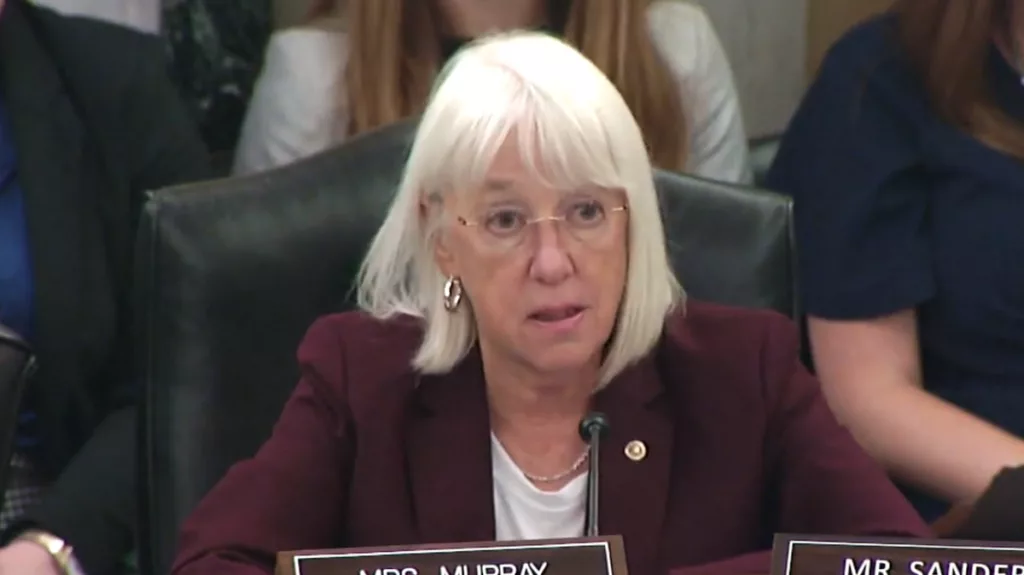WASHINGTON, D.C. – Pete Serrano’s days as a federal prosecutor appear to be numbered.
Serrano was named interim United States Attorney for the Eastern District of Washington earlier this month and can serve 120 days as he awaits confirmation by the U.S. Senate.
That’s not likely to happen.
Patty Murray, Washington’s senior Democratic senator, opposes his selection and plans to use a Senate maneuver known as the “blue slip” process to prevent the Pasco lawyer from serving in the federal post.
“Pete Serrano has tried to rewrite the history of the violent January 6th insurrection, thinks the Supreme Court overturning Roe and allowing states to pass criminal abortion bans was ‘the right decision,’ and has fought in court to unleash dangerous assault weapons on our streets,” she said in a statement.
“His extreme right-wing views are far out of step with the people of Washington state, and I will be using every legislative tool I have to block his confirmation,” she said.
Serrano was disappointed but not surprised.
“With Senator Murray’s comments, it is probably going to be an uphill battle,” Serrano said of his confirmation bid.
“There is a process and I am letting it play out,” he added during an interview on Tuesday night. “For now, I’m going to do my job serving the people of the Eastern District as best I can. If that’s not good enough, I guess I don’t know what is.”
Serrano was appointed on Aug. 6, and he was sworn in five days later. If he is not confirmed, the interim appointment will end Dec. 9.
There are 93 U.S. attorneys nationwide. They prosecute federal criminal cases and work on civil litigation involving the federal government. Serrano supervises a staff of approximately 79 prosecutors, civil litigators, and support personnel, according to the Department of Justice.
Serrano, 44, resigned as mayor of Pasco before taking the job. Last year, the conservative Republican lost his bid for state attorney general.
He is the founder of the conservative nonprofit Silent Majority Foundation, which has unsuccessfully challenged the state’s gun restrictions and COVID mandates.
Originally from California, he moved to Pasco in 2015 with his family. He worked as an environmental lawyer for the U.S. Department of Energy and at Energy Northwest before founding the Silent Majority Foundation, where he is now general counsel. Serrano is also the former leader of the Franklin County Republican Party.
He was one of the attorneys representing a gun shop owner over the state’s ban on ammunition magazines holding more than 10 rounds. The state Supreme Court sided with the state in May.
Blue slip battle
Serrano’s fate could be sealed by a longstanding Senate tradition that allows senators to block the advancement of nominees for U.S. attorney positions and federal judgeships in their states.
The way it works is that once a president makes a nomination, a consent form, known as a blue slip, is sent by the chair of the Senate Judiciary Committee to the two senators in the nominee’s home state.
If the forms are signed and returned, the process continues. If not, it signals a lack of support and the chair will not advance the nominee.
The century-old practice has irked President Donald Trump, who has had some of his picks opposed by Democratic senators. He has called it “old and outdated” and threatened legal action to end it.
“I have a Constitutional Right to appoint Judges and U.S. Attorneys, but that RIGHT has been completely taken away from me in States that have just one Democrat United States Senator,” Trump posted on social media.
Sen. Chuck Grassley, R-Iowa, chair of the Senate Judiciary Committee, pushed back Monday, posting on X that a nominee without a blue slip will not receive enough votes to get out of committee, let alone be confirmed on the Senate floor.
As chairman, he said he wants to set up Trump nominees “for success not failure.”
He isn’t alone. Republican Sen. Thom Tillis of North Carolina, a member of the Judiciary Committee, has publicly opposed ditching the practice, saying it would pave “the path for Democrats to ram through extremist liberal judges in red states over the long-term.”
Will the president intercede?
Serrano said he’s not met or spoken with Murray. Though deflated by her stance, he cautioned against presuming it will be the last word.
He pointed to Alina Habba, the president’s choice to be New Jersey’s top federal prosecutor.
Though New Jersey’s two Democratic U.S. senators, Cory Booker and Andy Kim, declined to submit a blue slip for her appointment, the Trump administration is trying everything it can to get Habba into the position since her 120-day tenure ended last month.
Thus far, they’ve encountered opposition from courts. Last week, a federal judge ruled Habba could not lawfully serve as U.S. attorney, rejecting the administration’s “novel” attempts to keep her in the job.
Serrano said he’s not talked with U.S. Attorney General Pam Bondi but views his situation “as pertinent” to the conversation on “whether or not the president should have the ability to make the appointments he wants.”
He said he’s thought about the situation he’s now facing and pondered “who can really help and who can be effective” in altering the outcome. Trump is the most obvious, he acknowledged.
“One hundred and twenty days is a long time,” he said. “This situation could drastically change well before the 120 days are up.”
This story first appeared on Washington State Standard.





